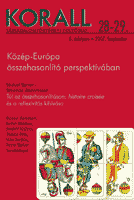Intézményesült változékonyság: a jóléti fejlődés sajátos meghatározói Kelet-Közép-Európában
Politics of institutionalized volatility: Distinctive determinants of welfare development in Central
and Eastern Europe
Author(s): Béla TomkaSubject(s): History
Published by: KORALL Társadalomtörténeti Egyesület
Summary/Abstract: The paper argues that the key determinants of welfare development of Central and Eastern Europe in the 20. century signifi cantly diff ered from the factors relevant in Western Europe; and that these diff erences have largely contributed to the current “mixed” nature, instability and volatility of the region’s welfare systems. The “mixed nature”, that is, the simultaneous application of social democratic and conservative solutions, by itself has increased the possibility of the welfare systems’ volatility. However, the existence of liberal tendencies that later accompanied it require further explanation, as path-dependency strongly prevails in the institutional domain in the region, furthermore, the predominant part of the population favours social democratic and conservative welfare solutions. The low level of cultural capital and further cultural factors in former communist countries have determinedly contributed to the fact that internal as well as external forces interested in rolling back the welfare state are able to enduringly question the welfare status quo through neo-liberal discourse and reforms. Consequently, the volatility of post communist welfare systems can be regarded as an institutionalized feature of Central and Eastern European welfare systems.
Journal: Korall - Társadalomtörténeti folyóirat
- Issue Year: 2007
- Issue No: 28-29
- Page Range: 146-166
- Page Count: 21
- Language: Hungarian

